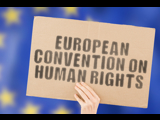Illegal Migration Bill Second Reading: 13-03-23
On Monday 13th March, MPs came together to debate and cast their votes for the first time - for or against - the Government’s Illegal Migration Bill, better known as the Anti Refugee Bill.
This vote is called Second Reading. This is when the Government Minister responsible for a Bill (in this case the Home Secretary, Suella Braverman), opens the Bill up for debate. The official opposition spokesperson (in this case, Yvette Cooper on behalf of Labour) then responds with their views and a debate takes place. At the end of the debate, MPs vote on whether the Bill should proceed to the next stage in the law-making process.
MPs voted that the Anti-Refugee Bill should proceed to the next stage, with 313 for and 251 against, that’s a majority of 62 (find out who voted here). The next stage of the process is called Committee stage and with this Bill is expected to be fast-tracked, happening over a few days rather than weeks or months. You can find out how laws are made here.
At BIHR, we have huge concerns about the Bill removing vital human rights protections for people. We got in touch with all MPs ahead of the vote asking them to stand firm on human rights law and vote against the Bill. You can read why we asked MPs to vote against the Bill here.
MPs' concerns with the Anti-Refugee Bill
Below is a summary of some of the concerns about the Bill raised by MPs from a range of political on Monday night before the votes were cast.

The Bill was challenged as incompatible with the European Convention on Human Rights (ECHR)
Seconds into the Home Secretary’s opening statement, Labour MP, Clive Lewis raised a point of order that on the 1st page of the Bill, the Home Secretary has made, “the phenomenal statement” that the Bill may not be compatible with the European Convention on Human Rights. Lewis points out that Section 19 of our UK Human Rights Act puts a duty on the Government to ensure the provisions of this Bill are compatible with that Convention. Ensuring this compatibility is not only “a moral requirement but also a practical necessity".
The Bill was challenged as engaging and possibly breaching at least 8 of the rights protected by the ECHR
Chair of the Joint Committee on Human Rights (JCHR), Joanna Cherry KC MP shared that the JCHR will be scrutinising the Bill carefully in due course and preparing a report. Cherry’s concerns at the moment are that, “In the Government’s human rights memorandum, the Government accepts that the Bill engages Articles 2,3,4,5,6,8,13 and 14 of the ECHR. And by her (the Home Secretary’s) Section 19 (1) (b) statement she accepts that some or all of these rights might be breached by the Bill.”

- Right to life (Article )
- Right to be free from torture and inhuman or degrading treatment (“serious harm”) (3)
- Right to be free from slavery or forced labour (4)
- Right to liberty (5)
- Right to a fair trial in relation to civil right (6)
- Right to family life (8)
- Right to an effective remedy (13)
- Right to be free from discrimination (14)
Read an Explainer on what’s in the European Convention on Human Rights

The Bill was challenged as being rushed through Parliament without scrutiny and with no proper impact assessment
Both Stuart C McDonald SNP MP and Alison Thewliss SNP MP raised the very serious concern of the lack of parliamentary scrutiny for this Bill and the rush to push it through Parliament “on the back of legislation, not even cold from last year” (The Nationality and Borders Bill presented at the time to be the solution to small boats crisis). The Government has chosen not to allow pre-legislative scrutiny of the Anti Refugee Bill. This is when Parliamentary Committees look at a draft of the Bill, think about how it will work and what its impact will be, and allow for changes to be made before it is formally ‘introduced’ to Parliament. There can also be the opportunity for open public discussion and consultation on what the Bill says. None of this has happened with the Anti Refugee Bill. It has been introduced at speed, and the next stage in the process is expected to be similarly quick. McDonald described the timetabling and lack of impact assessment a “disgrace.”
The Bill was challenged as being unworkable on its own
Sir Robert Buckland, Conservative MP raised that he feels, the Government is seeking to “once again” use law where Buckland believes, “it is operations that matter more than anything”. Buckland’s position is that the UK needs a managed system of return, a quota system. He questioned: “We came together on this on Ukraine”… “why on earth can’t we come together on this?” Buckland believes that we need to extend safe routes of passage in a controlled and measured way and that “it’s no good passing this legislation unless we do those other operational things.”


The Bill was challenged as bringing back the “most reprehensible” parts of the paused Bill of Rights Bill (better known as the Rights Removal Bill)
Chair of the JCHR, Joanna Cherry shared that the Committee published their report on the Rights Removal Bill back in January and they said that that Bill should be scrapped. She said, now, we see the Anti-Refugee Bill bringing back some of the “most reprehensible parts” of the Rights Removal Bill. Cherry flagged that today time permits the Chair to present only two of these concerning elements.
Firstly, the universality of rights. Cherry raised that Clause 15 of the Bill “undermines the fundamental principle of human rights by creating a class of people for whom the courts and the UK will not be required to interpret this Bill in a way that’s compatible with the Convention.”
Secondly, clause 49 (1) sets conditions on the UK’s compliance with interim measures issued by the court in Strasbourg. Cherry explained that similar to in UK courts, that such “orders are issued by the Strasbourg Court to prevent irreparable damage to human rights while a case is being considered.” As we flagged in our Call to Action for MPs, Cherry notes, “It was interim orders from the Strasbourg Court that stopped Russia executing British soldiers Shaun Pinner and Aiden Aslin.”
BIHR have written about the Rights Removal Bill here
The Bill was challenged as not workable yet ripping up our international reputation and longstanding commitment to human rights law
Yvette Cooper, Labour MP set out that the Bill “not do the things the Prime Minister and Home Secretary have promised”. For example, Cooper believes the Bill won’t clear the asylum backlog and will make it harder to get return agreements. She said the Bill won’t create controlled, managed safe alternatives systems but “it will rip up our long-standing commitment to international law, it will lock up children, remove support and safe refugees for woman who have been trafficked and deny citizenship to people like Mo Farrah.”


The Bill was challenged as being racist, classic divide and rule
Claudia Webbe, Independent MP described the Bill as “frightening”. Webbe said that the Bill sets precedent that the Government can derogate our rights, “not even children are safe under this Bill.”
Webbe believes this legislation is disguised to stop the boats but is actually designed to give the Government the power to pick and choose which people from which regions can apply for asylum. “Many would argue that this is racist legislation allowing safe and legal routes for a select group but not others in classic colonial style, divide and rule style.”
The Bill was challenged as being immoral, cruel and divisive
Caroline Lucas, Green MP raised that, “this is an immoral, deeply cruel and divisive Bill”. She said it is a Bill that “breaches international law”, “runs rough shod over human rights”, and “shames us all”. Lucas reminded the Government that behind the numbers and the statistics are “real people, with lives and hopes and families and dreams”. Lucas raised that the UN High Commissioner on Refugees has warned that this Bill would amount to an asylum ban. Lucas ended by saying that the Government on the front pages of this Bill are asking Parliament to rip up international law.

What happens now?
Whilst the Bill passed this stage of the law-making process, as the above shows very serious concerns were raised by MPs across political parties. It’s also important to say that a number of MPs in the governing party (The Conservative Party) cast no vote, 41 in total. Others in the Conservative party who voted for the Bill took the opportunity on Monday night to state their opposition to the Bill in its entirety and state their desire for amendments at the next stage.
For example, Simon Hoare, Conservative MP asked the Home Secretary to acknowledge that “many on the Government side of the House—me included—will vote for this Bill this evening, but with the clear understanding that we wish to see amendments to it as it progresses through Parliament, particularly in relation to women who are trafficked and to children? Our votes are being given in good faith tonight, in the expectation that the Bill can be amended. Does she accept that?”
The next stage of the law-making process is Committee stage, this involves a line-by-line examination of the Bill. Most Bills are looked at by a Public Bill Committee who can hear evidence from experts and interest groups from outside Parliament. The Anti-Refugee Bill, however, will go to a Committee of the Whole House and be decided on in just 3 days rather than going a specific committee for a detailed analysis. We expect this stage to begin before the Easter break for Parliament which is 30 March – 17 April.
BIHR will soon be producing a plain language guide to the rights risked by the Anti Refugee Bill and the impact on people. Keep an eye on our website for this and sign up to our newsletter.
What You Can Do
- The JCHR is conducting legislative scrutiny of the Anti-Refugee Bill. The Committee’s call for evidence is now open and you can submit your views to it by 6 April 2023 here.
- Get in touch with your MP and tell them your views on the Bill. You can find out who your MP is and their email address here.
- Find out more about the Bill on Amnesty UK and Refugee Action's websites.
BIHR is not responsible for the content of external sites or organisations.
Related topics
Stay up-to-date
Get our newsletter
Get monthly updates on UK human rights law and our work, resources and events sent straight to your inbox.






About the author
Carlyn
Head of Policy & Programmes